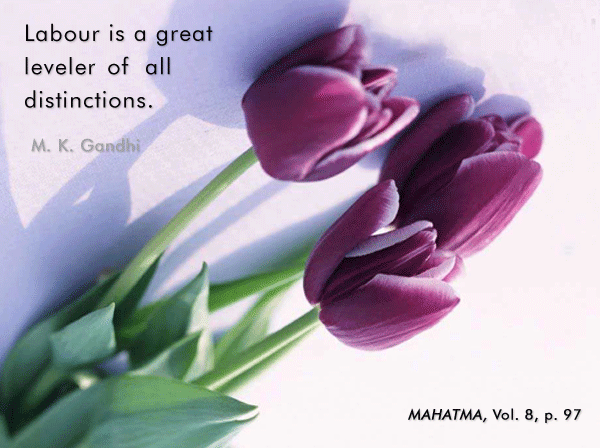85. LITERARY TRAINING :
It was seen in the last chapter how we provided for the physical training on Tolstoy Farm, and incidentally for the vocational. Though this was hardly done in a way to satisfy me, it may be claimed to have been more or less successful.
Literary training, however, was a more difficult matter. I had neither the resources nor the literary equipment necessary; and I had not the time I would have wished to devote to the subject. The physical work that I was doing used to leave me thoroughly exhausted at the end of the day, and I used to have the classes just when I was most in need of some rest. Instead, therefore, of my being fresh for the class, I could with the greatest difficulty keep myself awake. The mornings had to be devoted to work on the farm and domestic duties, so the school hours had to be kept after the midday meal. There was no other time suitable for the school.
We gave three periods at the most to literary training. Hindi, Tamil, Gujarati and Urdu were all taught, and tuition was given through the vernaculars of the boys. English was taught as well, it was also necessary to acquaint the Gujarati Hindu children with a little Samskrit, and to teach all the children elementary history, geography and arithmetic.
I had undertaken to teach Tamil and Urdu. The little Tamil I knew was acquired during voyages and in jail. I had not got beyond Pope's excellent Tamil handbook. My knowledge of the Urdu script was all that I had acquired on a single voyage, and my knowledge of the language was confined to the familiar Persian and Arabic words that I had learnt from contact with Musalman friends. Of Samskrit I knew no more than I had learnt at the high school, even my Gujarati was no better than that which one acquires at the school.
Such was the capital with which I had to carry on. In poverty of literary equipment my colleagues went one better than I. But my love for the languages of my country, my confidence in my pupils, and more than that, their generosity, stood me in good stead.
The Tamil boys were all born in South Africa, and therefore knew very little Tamil, and did not know the script at all. So I had to teach them the script and the rudiments of grammar. That was easy enough. My pupils knew that they could any day beat me in Tamil conversation, and when Tamilians, not knowing English, came to see me, they became my interpreters. I got along merrily, because I never attempted to disguise my ignorance from my pupils. In all respects I showed myself to them exactly as I really was. Therefore in spite of my colossal ignorance of the language I never lost their love and respect. It was comparatively easier to teach the Musalman boys Urdu. They knew the script. I had simply to stimulate in them an interest in reading and to improve their handwriting.
These youngsters were for the most part unlettered and unschooled. But I found in the course of my work that I had very little to teach them, beyond weaning them from their laziness, and supervising their studies. As I was content with this, I could pull on with boys of different ages and learning different subjects in one and the same class room.
Of text-books, about which we hear so much, I never felt the want. I do not even remember having made much use of the books that were available. I did not find it at all necessary to load the boys with quantities of books. I have always felt that the true text-book for the pupil is his teacher. I remember very little that my teachers taught me from books, but I have even now a clear recollection of the things they taught me independently of books.
Children take in much more and with less labour through their ears than through their eyes. I do not remember having read any book from cover to cover with my boys. But I gave them, in my own language, all that I had digested from my reading of various books, and I dare say they are still carrying a recollection of it in their minds. It was laborious for them to remember what they learnt from books, but what I imparted to them by word of mouth, they could repeat with the greatest ease. Reading was a task for them, but listening to me was a pleasure, when I did not bore them by failure to make my subject interesting. And from the questions that my talks prompted them to put, I had a measure of their power of understanding.
Mahatma Gandhi
86. (111-178)-TRAINING OF THE SPIRIT
To be continued ...

.jpg)



Comments